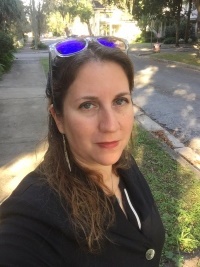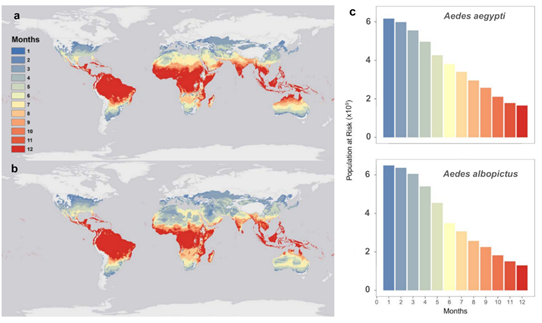
Speaker: Dr. Sadie Ryan
Associate Professor, Department of Geography, University of Florida
Thursday, January 16, 2020
2:50-3:50 PM (Period 8)
Turlington Hall Room 3018
University of Florida
All are welcome to attend.
Forecasting the impacts of climate change on vector-borne diseases (VBDs)—especially those under current public scrutiny and concern, such as malaria, dengue, chikungunya, and Zika—is a key component of global public health preparedness, and a key component of the ongoing issue of climate change preparedness. In this talk, I will showcase a strategy for applying ecophysiological models of temperature-dependent transmission to current and future climate models at large scales. I will demonstrate how our collaborative team have used these models to explore future scenarios for malaria, and for Aedes spp transmitted diseases, and how we can use mapping approaches as useful visualization tools, and how we tackle describing the multiple potential outcomes. I will also describe some local-scale, city and province level approaches to understanding vectorborne disease dynamics and management, and explore issues of how these two scales come together (or don’t) for decision making on the ground and in the boardroom.
Bio: Sadie J. Ryan is an Associate Professor of Medical Geography in the Department of Geography and in the Emerging Pathogens Institute (EPI) at the University of Florida, and PI of the Quantitative Disease Ecology and Conservation (QDEC) Lab group (www.sadieryan.net).
Ryan’s training is in Ecology and Evolutionary Biology (BA, Princeton), with an emphasis on conservation biology, quantitative ecology, and particularly, disease ecology. Ryan’s PhD work (UC Berkeley) centered on African buffalo spatial ecology in their savanna environment, in the context of an epidemic of Bovine Tuberculosis. Ryan’s postdoctoral work in Anthropological Science (Stanford, McGill), Ecology (NCEAS) and Geography (UCSB), launched her interdisciplinary work looking at the anthropogenic impacts of land use change, climate change, and conservation management goals in African parks landscapes, and the role of socioecological systems in disease transmission in Africa and Latin America.
This research continues today, investigating the multiscale issues of climate-health relationships in and on landscapes, and interactions with livelihoods, sustainability, parks management goals, the urban environment, and local perceptions. QDEC Lab is home to multiple projects in ecology at the human interface, spanning socioecological systems of vector borne and environmental disease ecology, climate-health modeling, insecticide resistance, and wildlife conservation, from Florida to the Old and New World tropics.
